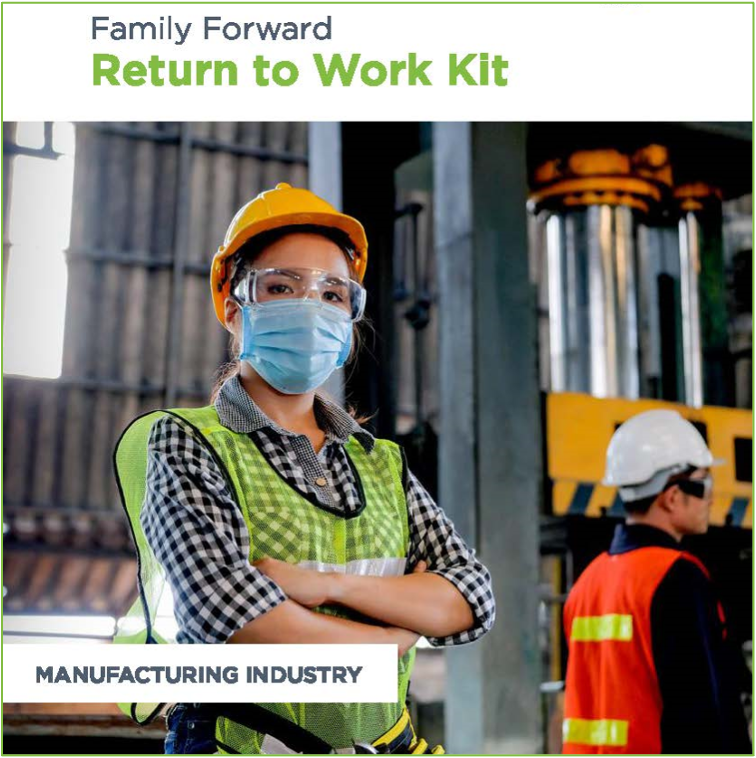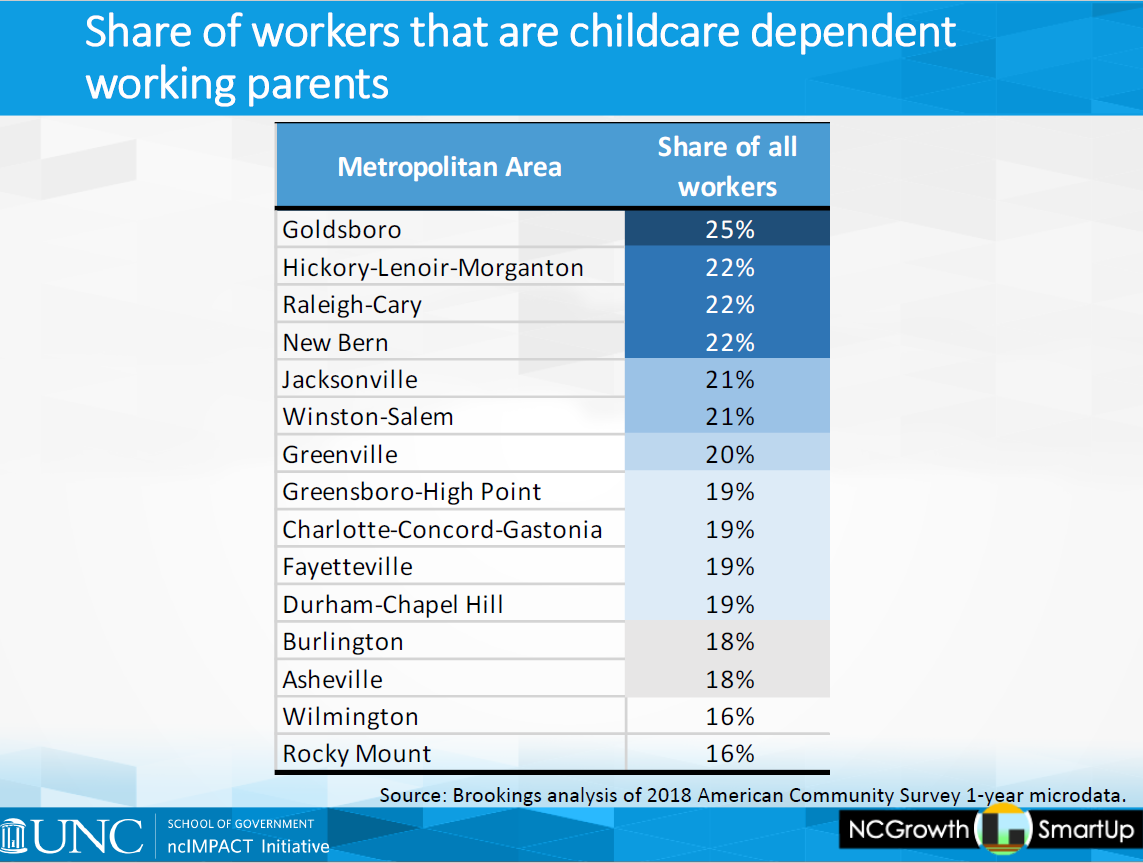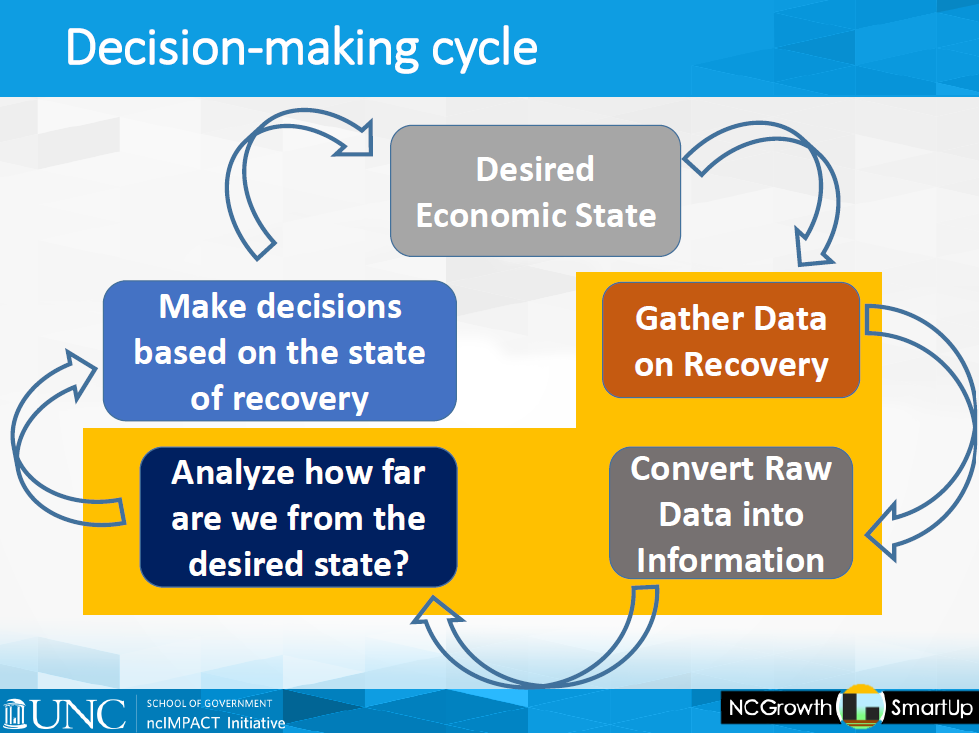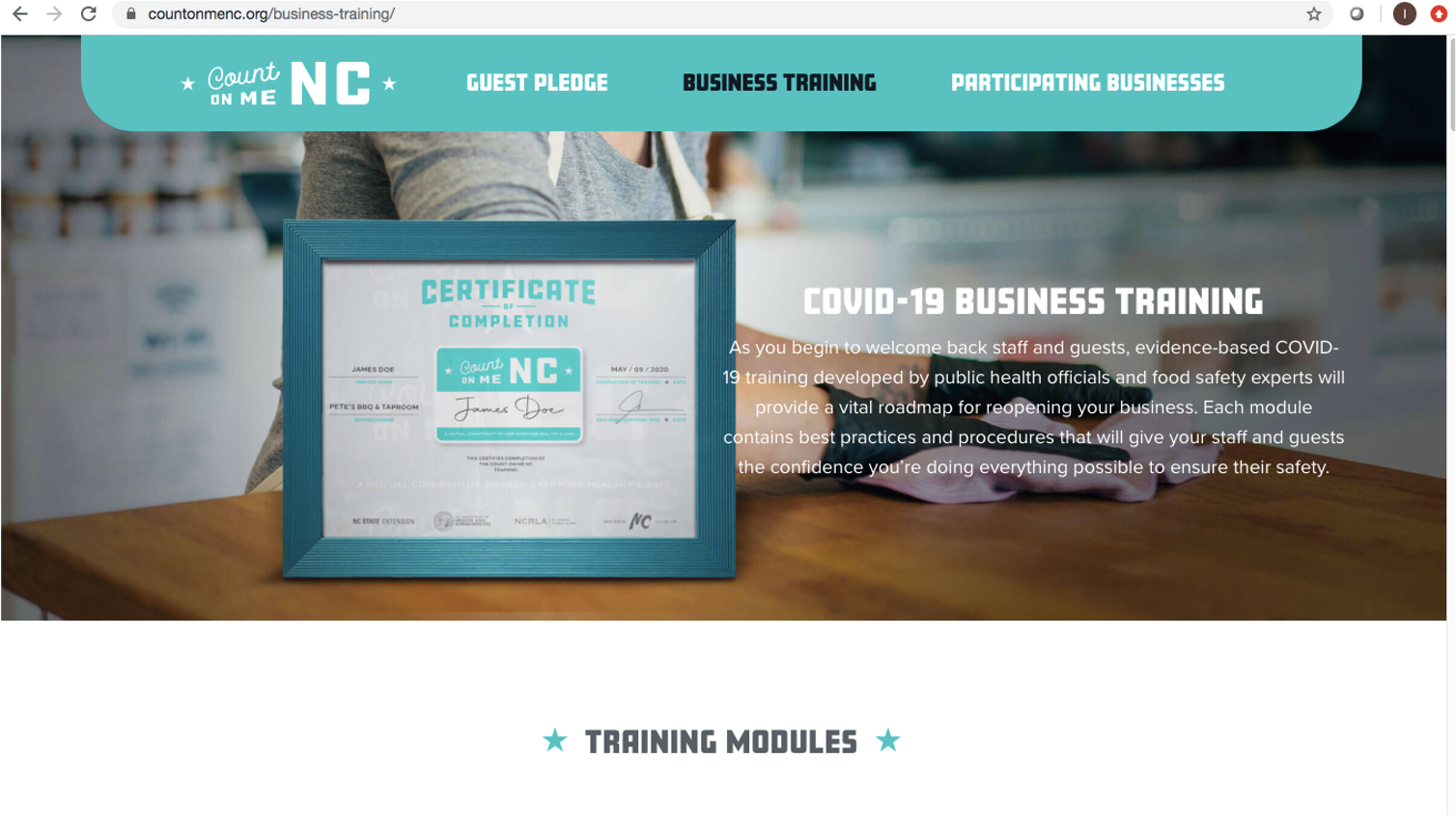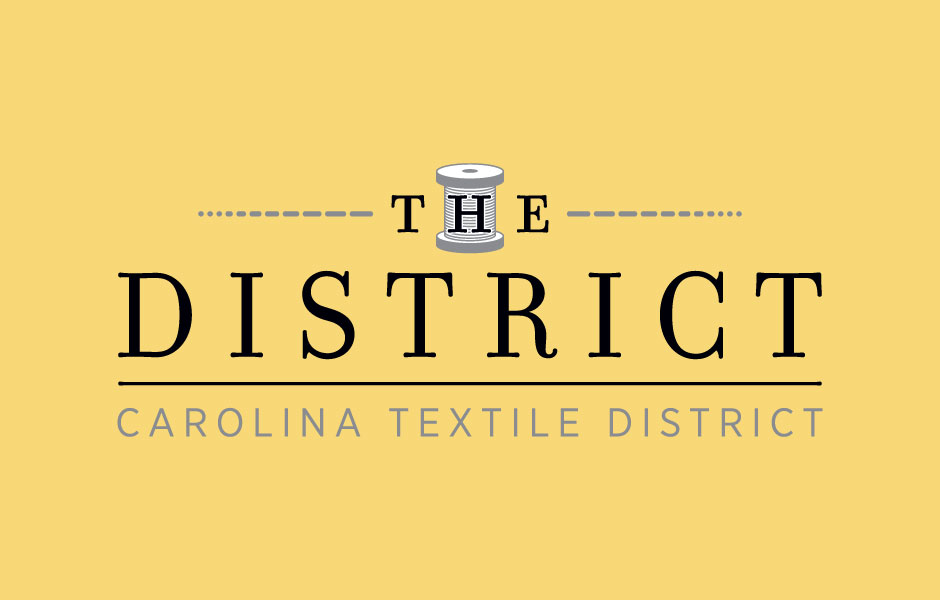Keys to Economic Recovery from COVID-19
Keys to Economic Recovery from COVID-19
What strategies will help local economies recover more quickly from the COVID-19 pandemic?
The ncIMPACT Initiative at the UNC School of Government and NCGrowth at the Kenan Institute for Private Enterprise are collaborating on a project to Identify strategies that will help local economies recover more quickly from the COVID-19 pandemic.
Through robust data analysis, case studies, webinars, and peer learning sessions, NC local governments have access to some of the best economic recovery resources in the nation.
This project was supported by the North Carolina Policy Collaboratory at the University of North Carolina at Chapel Hill, with funding from the North Carolina Coronavirus Relief Fund established and appropriated by the North Carolina General Assembly.
Access our Final Report: Testing the Keys to Economic Recovery from the COVID-19 Pandemic
Webinar Series
Discover solutions from our series of webinars where we share what we have learned, including your input, as the project has progressed. The webinars provide data analysis, case studies, resources, and strategies designed to assist with local economic recovery efforts. We continue to welcome your ideas regarding additional data needed and questions for which you need answers to lead and guide our state’s recovery.
Keys to Economic Recovery Webinar 1 – Project Introduction Sep. 30, 2020
Includes findings from our Spring 2020 survey of local governments, Data Indicators of Local Economic Conditions, and discussions with participants about what conditions would make residents feel more comfortable resuming economic activity and what promising strategies they observe in local communities.
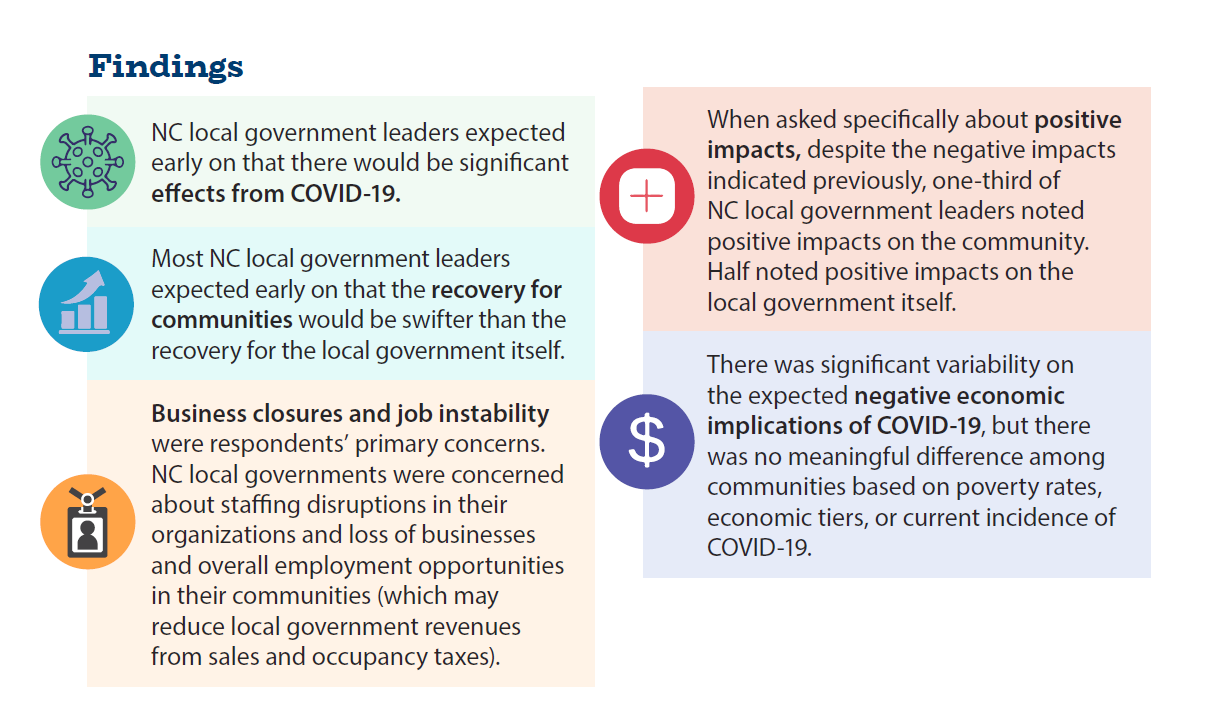 ncIMPACT Initiative Spring Survey 2020 – NC Local Government Early Responses to the Coronavirus Pandemic
ncIMPACT Initiative Spring Survey 2020 – NC Local Government Early Responses to the Coronavirus Pandemic
Keys to Economic Recovery Webinar 2 – Innovation in the Face of Crisis – Oct. 28, 2020
Ryan Smith, strategic initiatives manager, City of Durham and director, Durham Recovery & Renewal Task Force shared how the innovation process works in a crisis and the importance of municipalities and counties working together. Representatives from local innovations highlighted spoke about their efforts and answered questions from participants in breakout rooms. Local innovations include:
- Small business funding programs – Belmont & Fayetteville
- Increasing broadband access to support education & business sectors – Caldwell County
- Using data to inform and adjust child abuse reporting processes – Gaston County
- Pivoting on production to meet demand & secure employment – Carolina Textile District
Keep the Lights on in Belmont small business funding program
Keys to Economic Recovery Webinar 3 – Collaboration in the Face of Crisis – Nov. 18, 2020
Brian Elms, Innovation Practice Lead from the Change & Innovation Agency shared innovative collaborations from the pandemic and advised participants about collaborating more effectively in their communities. Lynn Minges from Count on Me NC, Lisa Finaldi from Family Forward NC, and Christopher Chung from Economic Development Partnership of NC described their strategies for strengthening local economies and answered questions from participants about how to implement the strategies locally. Data indicate the hospitality industry is impacted more than most sectors and that parents and caregivers are leaving the workforce or struggling to balance remote learning and child/elder care responsibilities.
Keys to Economic Recovery Webinar 4 – Data Informed Decision-Making – January 27, 2021
We shared tools including Carolina Tracker, Community Confidence, and the COVID Composite. Learn performance management strategies from UNC Chapel Hill professor Obed Pasha, and the robust discussion with local governments across the state. We also shared results of our COVID19 Fall Survey of Local Governments that reports how the pandemic has affected municipalities and counties across North Carolina.
Data Analysis
- ncIMPACT Initiative COVID Composite Tool metrics, data, visualizations, and documentation
- ncIMPACT Initiative COVID Composite Tool Demo & Walkthrough Explainer Video
- Information to Action Framework
- Employment by Metropolitan Statistical Area (MSA) and Statewide by Industry
- ncIMPACT Initiative Spring Survey 2020 – NC Local Government Early Responses to the Coronavirus Pandemic
- Carolina Tracker
- Community Confidence Tool
- ncIMPACT Initiative Fall Survey 2020 – NC Local Government Responses to the Coronavirus Pandemic
Resources
Explore a database of resources and strategies for local communities that represents a compilation of federal, state, local, and private resources available to small businesses and community organizations in North and South Carolina for dealing with the effects of COVID-19.
Sample Resources Used to Inform Testing the Keys to Economic Recovery from COVID-19
Count on Me NC & Family Forward NC Strategies Information: This document includes resources communities may use to implement strategies developed by Count on Me NC and Family Forward NC. Count on Me NC encourages businesses, staff, guests, and visitors to each do their part in preventing the spread of COVID-19, highlighting a collective responsibility, and inviting everyone throughout the state to join the collaboration. Family Forward NC created a Rapid Response program to help employers adapt to the conditions caused by COVID-19. They provide no-cost human resources assistance and consultation to help employers that are reopening or retooling, with the goal of building workplace resilience for families that will endure even after the crisis.
Share these resources for nonprofit organizations and others responding to COVID-19 offered by the Office of State Budget and Management Office of Strategic Partnerships and the North Carolina Center for Nonprofits. Resources are organized by category: grants and funding, professional assistance and training, food supply and technology, general COVID-19 information and restrictions, and COVID-related workplace safety
The NC League of Municipalities now has a centralized site for information related to the American Rescue Plan and the dedicated funds for N.C. and its cities. It will continue to be updated as more information on the implementation of the ARP is available.
The UNC School of Government’s Coates’ Canons blog offers insight on the American Rescue Plan Act of 2021: Local Government Authority to Expend their Allocations.
Best Practices in Community Engagement are covered in this presentation offered during the October 26 session of the UNC School of Government’s 6-class series on The Basics of the American Rescue Plan Act.
N.C. Department of Revenue Business Recovery Grants will issue a one-time payment to eligible North Carolina businesses that experienced significant economic loss due to COVID-19. The application period closes January 31, 2022. The NCDOR will administer the program.
ARPA Ideas for Philanthropy: This document offered by the NC Office of Strategic Partnerships answers the question, “How might philanthropy leverage or complement the American Rescue Plan Act in North Carolina?”
American Rescue Plan Fact Sheet: This resource offered by the International City/County Management Association (ICMA) offers two pages of helpful links, resources and information.
Case Studies
- Caldwell County – Increasing broadband access to support education & business sectors: In Caldwell County, several partners came together to bridge the digital divide and support students when the COVID-19 pandemic hit. Caldwell Community College and Technical Institute leveraged an existing relationship with Google to improve broadband access and obtain 75 Chromebooks. Doing so allowed high school and community college students to continue their coursework remotely uninterrupted, ensuring continuity in the county’s talent development pipeline through the pandemic.
- Carolina Textile District – Pivoting on production to meet demand & secure employment: The Carolina Textile District (CTD) is a network of firms with a focus on the textile and apparel manufacturing industry, and a part of The Industrial Commons (TIC), a social enterprise non-profit organization located in Burke County. The District pivoted its work in response to COVID-19 and subsequent demand for personal protective equipment (PPE) and cloth face coverings, supplying hospitals and public-school systems, among other clients throughout North Carolina.
- City of Belmont – Small business funding programs: Belmont paired an emergency small business loan program with the “Keep the Lights on in Belmont” program to drive residents to support local enterprises and raise funds for an emergency relief grant for downtown businesses.
- City of Fayetteville – Small business funding programs: The City of Fayetteville, NC expanded on an existing small business loan program to fund emergency grants intended to keep businesses from shutting down in the area. Through a dense network of partnerships, the City was able to target assistance to the businesses that needed it most.
- Gaston County – Using data to inform and adjust child abuse reporting processes: Leadership in Gaston County noticed that reports of child abuse significantly decreased during the COVID-19 pandemic. The assistant county manager gathered community stakeholders to address process improvements for reporting to ensure the wellbeing of children and families.
- The Center for Advanced Hindsight (CAH) at Duke University – improving community response to COVID-19: CAH partnered with the NC State College of Design, Cabarrus County, Catawba County, Gaston County, Haywood County, and Union County to use insights from behavioral science and design to improve community response to COVID-19.
- New Bern, NC took a collaborative approach to maintain tourism and support small businesses: They leveraged statewide resources and ran several programs to ensure that local businesses could reopen and position the town as a safe travel destination.
- City of Puyallup, WA – Funding to support businesses adapting to serve customers outdoors: Through the Winter Ready Funds Program, the City of Puyallup awards one-time $5,000 grants (a total of $150,000) to eligible local restaurant and retail businesses for purchasing equipment and making other necessary adjustments to be able to serve customers outdoors during the pandemic restrictions. The project is supported through a grant from the US Department of Treasury and administered by the Washington State Department of Commerce’s Local Government Coronavirus Relief Fund.
Blog Posts
- Keys to Economic Recovery from COVID-19
- Small Town Economics & COVID19 Population Reshuffle
- Innovations in the Face of Crisis
- What Can We Do About COVID-19 LEARNING LOSS?
- ‘Tis the Season – 12 Days of Data
- Collaboration in the Face of Crisis: The Keys to Economic Recovery from COVID-19
- Economic Recovery from the COVID-19 Pandemic in the Fayetteville Region
Videos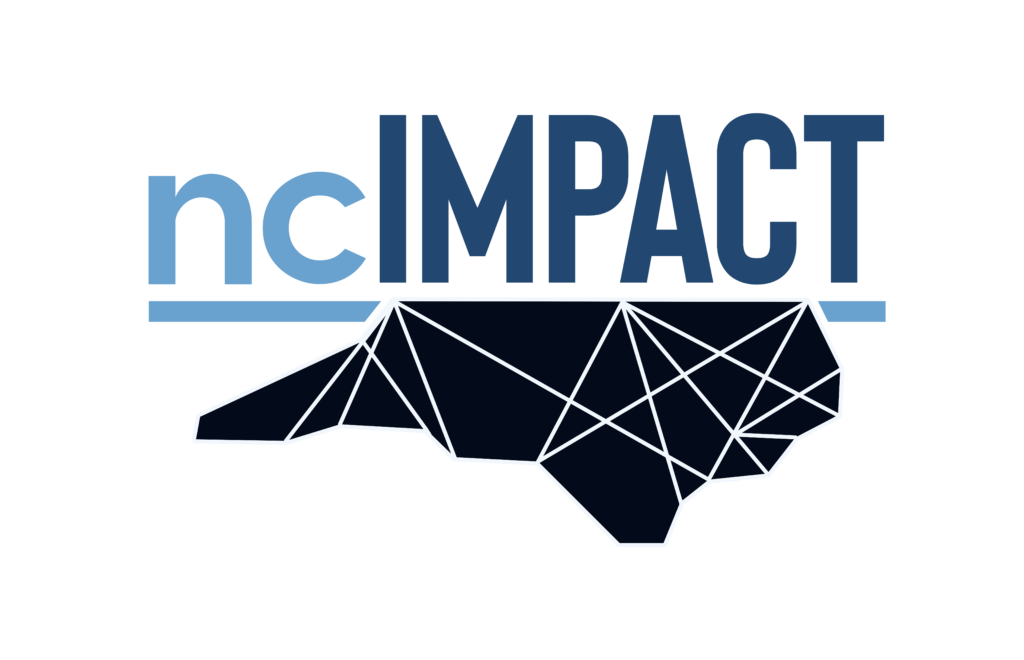
- ncIMPACT Town Hall: Child Well-Being & COVID-19
- ncIMPACT Townhall: Substance use, Recovery, and COVID-19
- ncIMPACT Townhall: COVID-19 and Telehealth
- ncIMPACT Townhall: Broadband Under Quarantine
- Making Data-Informed Decisions for Economic Recovery – Webinar 4
-
Webinar Excerpts
This project is a collaboration between

